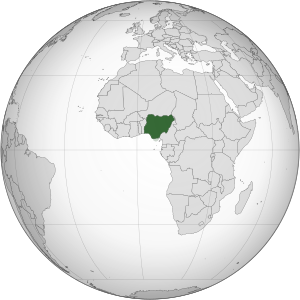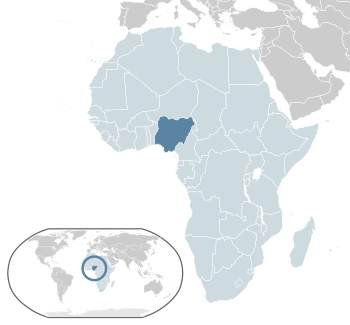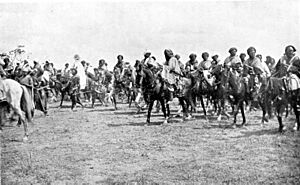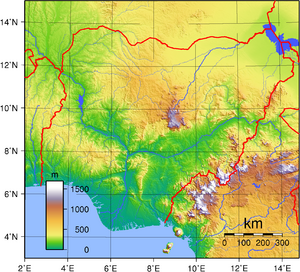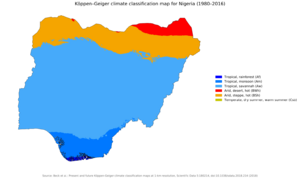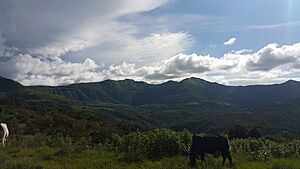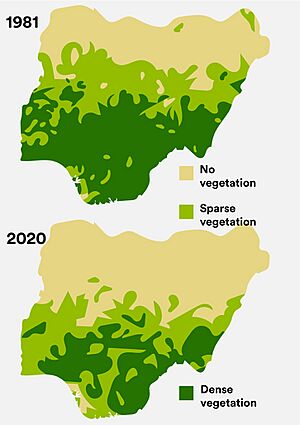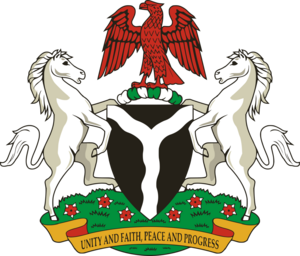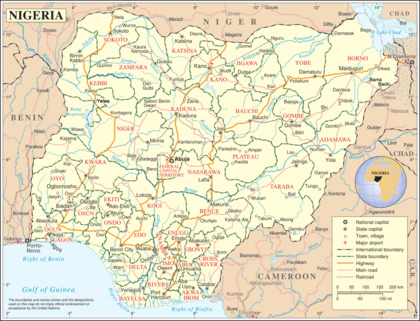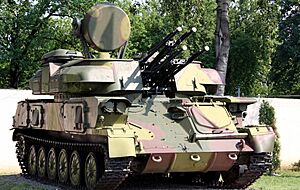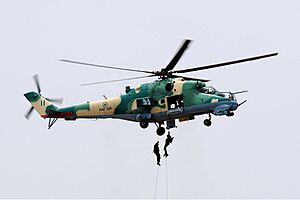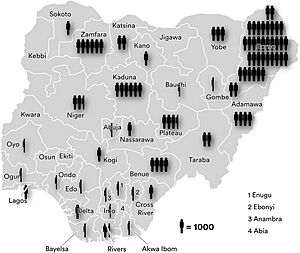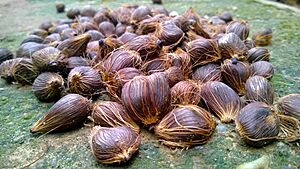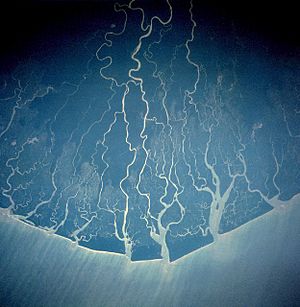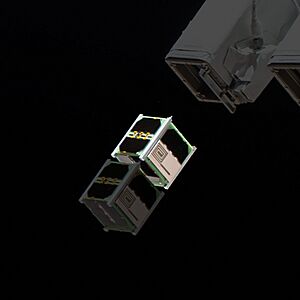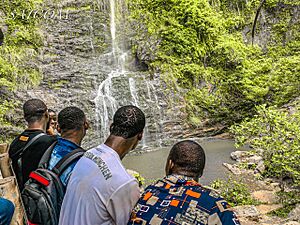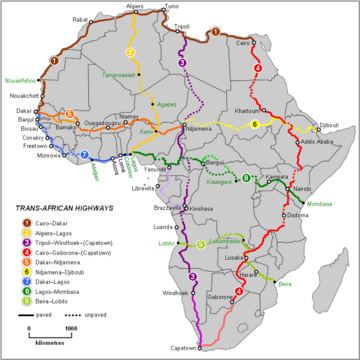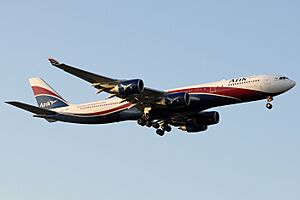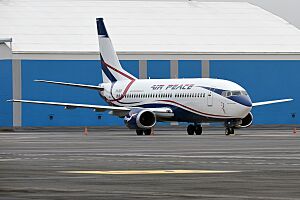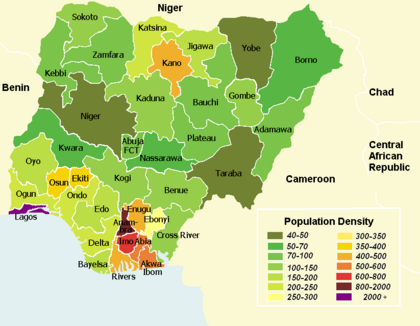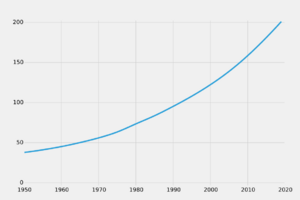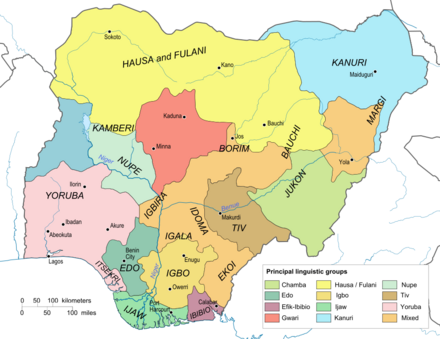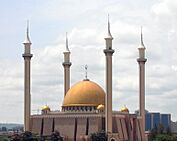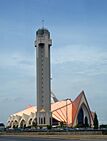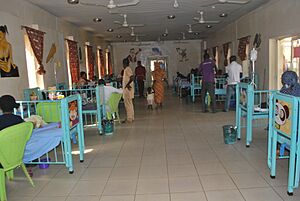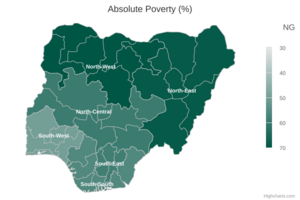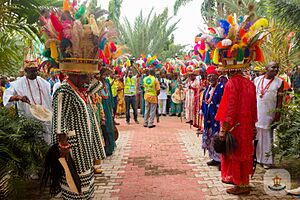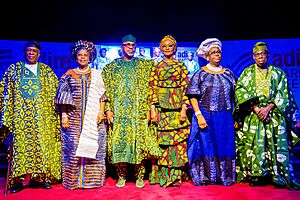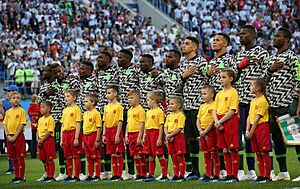Nigeria facts for kids
Quick facts for kids
Federal Republic of Nigeria
Name in national languages
|
|||
|---|---|---|---|
|
|
|||
|
Motto: "Unity and Faith, Peace and Progress"
|
|||
|
Anthem: "Nigeria, We Hail Thee"
|
|||
| Capital | Abuja 9°4′N 7°29′E / 9.067°N 7.483°E |
||
| Largest city | Lagos | ||
| Official languages | English | ||
| Recognised languages | |||
| Regional languages | Over 525 languages | ||
| Ethnic groups
(2018)
|
|||
| Religion
(2018)
|
|
||
| Demonym(s) | Nigerian | ||
| Government | Federal presidential republic | ||
| Bola Tinubu | |||
| Kashim Shettima | |||
|
• Senate President
|
Godswill Akpabio | ||
| Legislature | National Assembly | ||
| Senate | |||
| House of Representatives | |||
| Independence
from the United Kingdom
|
|||
| 1 January 1900 | |||
| 1 January 1900 | |||
|
• Unification of Nigeria
|
1 January 1914 | ||
|
• Declared independent as a sovereign state
|
1 October 1960 | ||
|
• Became a republic
|
1 October 1963 | ||
|
• Current constitution
|
29 May 1999 | ||
| Area | |||
|
• Total
|
923,769 km2 (356,669 sq mi) (31st) | ||
|
• Water (%)
|
1.4 | ||
| Population | |||
|
• 2024 estimate
|
|||
|
• Density
|
249.8/km2 (647.0/sq mi) (57th) | ||
| GDP (PPP) | 2025 estimate | ||
|
• Total
|
|||
|
• Per capita
|
|||
| GDP (nominal) | 2025 estimate | ||
|
• Total
|
|||
|
• Per capita
|
|||
| Gini (2020) | ▼ 35.1 medium |
||
| HDI (2023) | medium · 164th |
||
| Currency | Naira (₦) (NGN) | ||
| Time zone | UTC+01:00 (WAT) | ||
| Date format | dd/mm/yyyy | ||
| Driving side | right | ||
| Calling code | +234 | ||
| ISO 3166 code | NG | ||
| Internet TLD | .ng | ||
Nigeria, officially known as the Federal Republic of Nigeria, is a large country in West Africa. It stretches from the dry Sahel region in the north to the Gulf of Guinea in the Atlantic Ocean in the south. Nigeria covers an area of about 923,769 square kilometers. It is the most populous country in Africa, with over 236 million people. This makes it the sixth-most populous country in the world.
Nigeria shares borders with Niger to the north, Chad to the northeast, Cameroon to the east, and Benin to the west. It is a federal republic made up of 36 states and the Federal Capital Territory. The capital city, Abuja, is located there. The biggest city in Nigeria is Lagos, which is one of the largest cities in the world and the biggest in Africa.
For thousands of years, Nigeria has been home to many different cultures and kingdoms. The Nok culture, around 1500 BC, was one of the earliest known civilizations. Later, powerful kingdoms like the Hausa Kingdoms in the north, the Kingdom of Benin in the south, the Kingdom of Nri in the southeast, and the Oyo Empire in the southwest grew. In the 19th century, the Sokoto Caliphate became a large empire in the north.
Modern Nigeria began when the British took control in the 19th century. Different areas were joined together in 1914. Nigeria became an independent country on 1 October 1960. After independence, the country faced some challenges, including a civil war from 1967 to 1970 and periods of military rule. However, it has had a stable democratic government since 1999.
Nigeria is a country with many different people, having over 250 ethnic groups and 500 distinct languages. The three largest groups are the Hausa, Yoruba, and Igbo. Together, they make up more than 60% of the population. English is the official language, helping people from different groups communicate. Nigeria is home to large Muslim and Christian populations, with Muslims mostly in the north and Christians mostly in the south. Some people also follow older traditional beliefs.
Nigeria is an important country in Africa and plays a role in international matters. Its economy is the fourth-largest in Africa and is considered a growing economy. Nigeria is a founding member of the African Union and belongs to many other international groups, like the United Nations and OPEC. People sometimes call it the "Giant of Africa" because of its large population and economy.
Contents
Discovering Nigeria's Name
The name Nigeria comes from the Niger River that flows through the country. A British journalist named Flora Shaw first suggested this name on 8 January 1897. The nearby country of Niger also gets its name from the same river. The exact origin of the name Niger is not fully known, but it might come from a local word meaning "river of rivers." Before the name Nigeria was chosen, other ideas included Niger Empire and Hausa Territories.
Nigeria's Rich History
Ancient Times in Nigeria
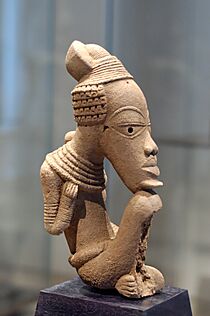
Long ago, people in Nigeria were skilled in working with iron. Evidence from places like Kainji Dam shows ironworking as early as the 2nd century BC. This means people learned to work with iron without first using bronze. Some researchers believe ironworking developed independently in Africa.
The Nok civilization was active between 1500 BC and 200 AD. They created amazing life-sized terracotta figures, which are some of the oldest sculptures in Africa. They also melted iron around 550 BC, and possibly even earlier. Iron smelting has also been found in the Nsukka region, dating back to 2000 BC in Lejja and 750 BC in Opi.
Early Kingdoms and Empires
The Kano Chronicle tells us about the ancient Hausa city-state of Kano, which dates back to around 999 AD. Other major Hausa cities like Daura and Katsina also have histories from the 10th century. As Islam spread from the 7th century AD, this region became known as Sudan, meaning "Land of the Blacks" to Arab traders.
The Kingdom of Nri of the Igbo people grew strong in the 10th century. It lasted until the British arrived in 1911. The city of Nri is seen as the birthplace of Igbo culture. The oldest bronze artworks made using the lost wax process in West Africa were found in Igbo-Ukwu, a city influenced by Nri.
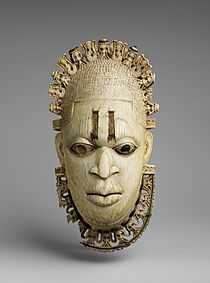
In southwestern Nigeria, the Yoruba kingdoms of Ife and Oyo became important in the 12th and 14th centuries. The earliest signs of people living in Ife date back to the 9th century. They created beautiful terracotta and bronze figures.
Pre-Colonial Era and European Trade
In the 16th century, Portuguese explorers were the first Europeans to trade directly with people in southern Nigeria. They traded goods at ports like Lagos and Calabar. This coastal trade also marked the beginning of Europeans taking people from Africa to work in other lands. Many people were captured in raids and wars and then taken to these ports. They were often forced to work in other territories. After a while, the trade in people was made illegal in 1807. British ships tried to stop this trade, and people who were freed were often taken to Freetown.
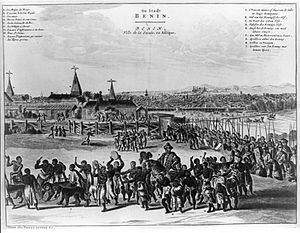
In the north, the Fulani people gained power in the early 19th century. Usman dan Fodio led a successful movement that created the large Sokoto Caliphate. This empire grew quickly and spread its influence, connecting different regions and promoting Islamic culture. The use of many workers, some of whom were enslaved, was common in farming within the empire. By the early 1900s, the Sokoto Caliphate was one of the largest pre-colonial African states.
British Rule and Independence
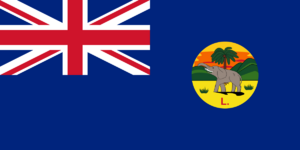
Britain became more involved in Nigeria in the mid-1800s. They took control of Lagos in 1861. British missionaries also moved inland, bringing Western education. In 1885, other European countries recognized Britain's influence in West Africa. The Royal Niger Company helped Britain take control of southern kingdoms. In 1900, these areas became the Southern Nigeria Protectorate.
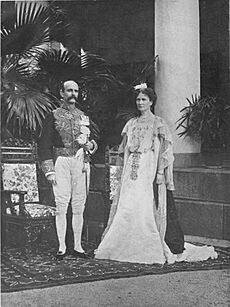
The British then moved north into the Sokoto Caliphate. General Frederick Lugard led these efforts. By 1903, the British had taken control of the caliphate's main areas. Lugard ended the caliphate but kept the title of sultan as a symbolic role in the new Northern Nigeria Protectorate.
On 1 January 1914, the British officially joined the Southern and Northern Protectorates to form the Colony and Protectorate of Nigeria. The southern region had more contact with Europeans and Western education. The British used a system called "indirect rule," working with traditional leaders.
After World War II, many African countries sought independence. Nigeria also pushed for self-rule. The British government gradually gave Nigeria more control over its own affairs. On 1 October 1960, Nigeria became a fully independent country, the Federation of Nigeria. Abubakar Tafawa Balewa became its first Prime Minister.
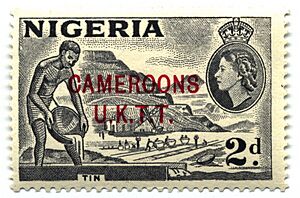
At independence, there were clear cultural and political differences among Nigeria's main ethnic groups: the Hausa in the north, Igbo in the east, and Yoruba in the west. These differences sometimes led to political challenges.
Early Republic and Challenges
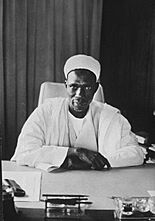
After independence, political disagreements grew. This led to a period of instability and changes in government. In 1966, there were two military takeovers. These events caused tensions between different parts of the country. Many Igbo people in northern cities faced difficulties and moved to the Eastern Region.
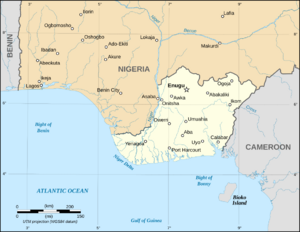
In May 1967, the Eastern Region declared itself an independent state called the Republic of Biafra. This led to the Nigerian Civil War, which lasted for 30 months until January 1970. The war caused great hardship and suffering for many people in the former Eastern Region. Countries like Britain and the Soviet Union supported the Nigerian government, while France and Israel aided Biafra.
After the war, Nigeria's oil industry grew rapidly in the 1970s, bringing in a lot of money. However, this money did not always lead to better living conditions for everyone. The government became very reliant on oil income. More changes in government followed, with new military leaders taking charge. They tried to improve how the country was run and deal with problems like inflation.
Military Rule and Return to Democracy
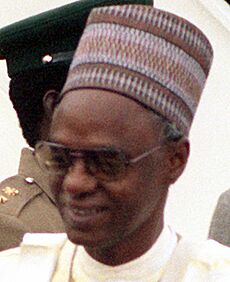
In 1979, Nigeria returned to civilian rule with Shehu Shagari becoming the first elected President. This was a peaceful transfer of power from the military. However, after his re-election in 1983, there were concerns about the fairness of the elections.
This led to another military takeover in 1983, with Major General Muhammadu Buhari becoming head of state. Later, Ibrahim Babangida took power in 1985. He made plans for Nigeria to return to democracy, but these plans were delayed. Elections were held in 1993, but the results were cancelled, causing widespread protests.
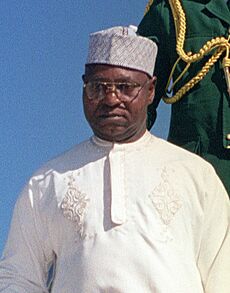
After another military leader, General Sani Abacha, took power, Nigeria faced international criticism for its actions against activists. His rule ended in 1998. His successor, General Abdulsalami Abubakar, helped create a new constitution and prepared for multi-party elections.
Modern Nigeria: 1999 to Today
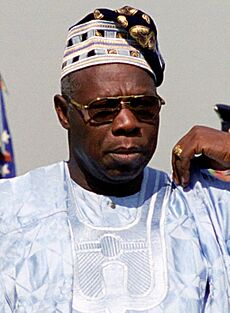
On 29 May 1999, Olusegun Obasanjo, a former military ruler, became the elected President of Nigeria. This marked the start of the Fourth Nigerian Republic, bringing an end to many years of military rule. Under Obasanjo, Nigeria made progress in becoming more democratic, even though some elections faced criticism.
In 2007, Umaru Yar'Adua became president. After his death in 2010, Vice President Goodluck Jonathan took over and won the 2011 election. During his time, Nigeria's economy grew, but the country also faced challenges with public funds and the rise of groups like Boko Haram. These groups caused serious problems, including attacks and the abduction of schoolgirls.
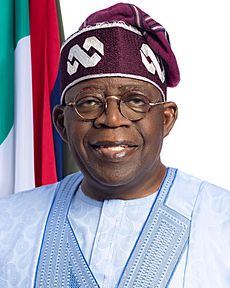
In the 2015 election, Muhammadu Buhari, another former military leader, was elected president. He was known for his efforts to fight corruption. The election was seen as fair, and it was the first time an acting president lost re-election in Nigeria. During Buhari's time, Nigeria continued to face security issues and economic challenges. He was re-elected in 2019.
The 2023 presidential election saw new candidates. Bola Tinubu of the ruling party won the election and became president on 29 May 2023. His government is working to solve ongoing domestic challenges, including safety concerns in different parts of the country. In December 2025, the United States carried out a strike against militant groups in northwest Nigeria at the request of Tinubu's government. On 29 May 2024, Nigeria reinstated its old national anthem, "Nigeria, We Hail Thee."
Exploring Nigeria's Geography
Nigeria is located in western Africa on the Gulf of Guinea. It covers a total area of about 923,768 square kilometers, making it the world's 32nd-largest country. Its borders stretch for 4,047 kilometers, shared with Benin, Niger, Chad, and Cameroon. Nigeria's coastline is at least 853 kilometers long. The highest point in Nigeria is Chappal Waddi, which is 2,419 meters tall.
The main rivers are the Niger and the Benue. They join together and flow into the Niger Delta, one of the world's largest river deltas. This area has many Central African mangrove forests.
Nigeria's landscape includes the valleys of the Niger and Benue rivers, which form a Y-shape. To the southwest of the Niger River, there are rugged highlands. To the southeast of the Benue River, you'll find hills and mountains, including the Mambilla Plateau, the highest plateau in Nigeria.
The far south of Nigeria has a tropical rainforest climate with lots of rain. Here, you can find the Obudu Plateau and Coastal plains. Mangrove swamps grow along the coast. The area near the Cameroon border is a rich rainforest, home to many different plants and animals, including the drill primate.
Between the far south and the far north, Nigeria has savannah lands. These areas have grasses and flowers with scattered trees. The amount of rainfall is less here. The savannah zone has different types, from tall grass plains to patches of grass and sand in the northeast.
Waterways and Lakes
Nigeria has two main water systems: the Lake Chad basin and the Niger River basin. The Niger basin covers about 63% of the country. The Benue River is a major branch of the Niger.
In the dry northeast, near the Sahara Desert, lies Lake Chad. This lake is shared with Niger, Chad, and Cameroon. Over time, Lake Chad has changed in size many times. In recent decades, it has shrunk a lot, partly because people use its water for farming.
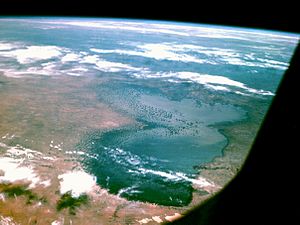
The flat plains of northeastern Nigeria are part of the Chad Basin. Other rivers in the northeast include the Ngadda and Yedseram. Nigeria also has many rivers along its coast.
Plants and Natural Areas
Nigeria has three main types of natural areas: forests, savannahs, and montane lands.
- Forests: These areas have many trees. The southernmost parts, especially around the Niger and Cross River deltas, have mangrove swamps. North of these are freshwater swamps, and further north are rainforests.
- Savannahs: These areas have fewer trees, with grasses and flowers growing between them. They include:
- Guinean forest-savanna mosaic: Plains of tall grass with scattered trees.
- Sudan savannah: Shorter grasses and shorter trees.
- Sahel savannah: Patches of grass and sand, found in the northeast.
- Montane lands: These are the least common and are mainly found in the mountains near the Cameroon border, like the Mambilla Plateau.
Environmental Challenges
Nigeria faces environmental challenges like managing waste, protecting its forests, and dealing with the effects of climate change.
Protecting Forests In 2005, Nigeria had one of the highest rates of deforestation in the world. This means many forests were cut down. Between 1990 and 2005, Nigeria lost about 35.7% of its forest cover.
Dealing with Pollution Managing waste is a big problem in large cities like Lagos. This is due to population growth and difficulties in handling industrial and household waste. Poor planning and lack of proper systems lead to waste polluting waterways and groundwater.
The Niger Delta region is one of the most polluted areas in the world. This is due to serious oil spills and other problems from the oil industry. This pollution has also led to local disagreements. Illegal oil processing, where people turn stolen crude oil into fuel, is very dangerous and causes a lot of pollution. These activities have led to accidents and harm to the environment. In 2022, 125 people died from explosions at illegal refineries.
In 2010, thousands of people in Zamfara State were accidentally exposed to lead from informal gold mining. This caused serious health problems, especially for children.
Nigeria's Government and Society
How Nigeria is Governed
Nigeria is a federal republic, similar to the United States. It has 36 states and the capital city, Abuja, which is a separate area. The President leads the country and the federal government. The president is elected by the people for a maximum of two four-year terms. State governors are also elected for four years and can serve two terms.
The president's power is balanced by the National Assembly, which has two parts: the Senate and the House of Representatives. The Senate has 109 members, with three from each state and one from Abuja. The House has 360 members, with the number from each state based on its population.
To become president, a candidate needs to win the most votes and get at least 25% of the votes in 24 out of the 36 states. Traditionally, presidential candidates choose a running mate (for vice president) from a different ethnic and religious background to represent the country's diversity. However, in the 2023 elections, the ruling party's candidate, Bola Tinubu, who is Muslim, chose another Muslim, Kashim Shettima, as his running mate.
States and Cities
Nigeria is divided into 36 states and one Federal Capital Territory. These are further divided into 774 local government areas. Sometimes, the states are grouped into six larger areas called geopolitical zones.
Nigeria has many large cities. Five cities have over a million people: Lagos, Kano, Ibadan, Benin City, and Port Harcourt. Lagos is the largest city in Africa, with over 12 million people in its urban area. The southern part of the country has many cities and a high population density.
Laws and Justice
The Constitution of Nigeria is the highest law in the country. Nigeria has four different legal systems:
- English law: This includes British laws from when Nigeria was a colony.
- Common law: This is based on important court decisions made in Nigeria.
- Customary law: This comes from traditional local rules and practices.
- Sharia law: Also known as Islamic Law, this is used for Muslims in twelve northern states and some other states. It has its own rules for certain actions.
Nigeria has a judicial branch, and its highest court is the Supreme Court of Nigeria.
International Relationships
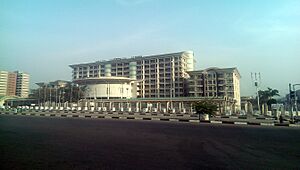
Since gaining independence in 1960, Nigeria has focused on working with other African countries. It helped movements against minority governments in Southern Africa. Nigeria was a founding member of the Organisation of African Unity (now the African Union) and has a lot of influence in West Africa. It helped create regional groups like the Economic Community of West African States (ECOWAS).
Nigeria has also sent troops to help in other countries, like the Congo, as part of United Nations efforts. It supports causes for self-government and is a member of many international organizations.
Nigeria has been a key player in the international oil industry since the 1970s and is a member of OPEC. Its role as a major oil producer is important in its relationships with other countries.
Trade between China and Nigeria has grown a lot. However, Nigeria imports much more from China than it exports, which is a challenge for Nigeria's own industries. Nigeria also proposed a single currency for West Africa called the Eco, but this plan has been delayed.
Nigeria's Military Forces
The Nigerian Armed Forces are the combined military forces of Nigeria. They include the Nigerian Army, Nigerian Navy, and Nigerian Air Force. The President of Nigeria is the commander-in-chief of the armed forces. With over 223,000 active personnel, Nigeria's military is one of the largest in Africa.
In 2020, Nigeria had 143,000 troops in its armed forces and another 80,000 personnel for other security roles. The country spent about US$2.26 billion on its armed forces in 2022.
Keeping Peace and Safety
Nigeria has faced challenges from groups like Boko Haram and other armed groups, which have caused many people to leave their homes. The government and other countries are working together to bring peace and safety to these areas. By October 2015, Boko Haram had been pushed out of most cities it controlled. In 2022, many fighters surrendered, but a splinter group called ISWAP remains active.
There have also been concerns about police actions. The Nigerian government is working to address these issues and protect its citizens. In the Niger Delta, there were attacks on oil facilities by militant groups in 2016. The government tried to address these issues through both force and talks.
In central Nigeria, there have been disagreements and conflicts over land and resources between different communities. These clashes have sometimes led to many lives being lost. The government is working to find solutions to these conflicts.
Nigeria's Economy and Resources
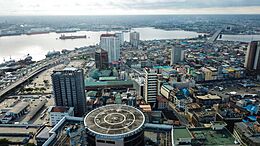
Nigeria's economy is the fourth largest in Africa and the 31st-largest in the world by its nominal GDP. Its estimated GDP (PPP) for 2025 was $2.254 trillion. As of 2023, Nigeria's economy is considered lower-middle-income.
After years of military rule, Nigeria's economy grew quickly with the return of democracy and new economic plans. Nigeria is a leader in Africa in several areas, including energy, finance, medicine, and entertainment. Its banking sector is well-developed. Money sent home by Nigerians living abroad is a major source of income for the country.
Nigeria also has many natural resources that are not fully used, such as coal, gold, tin, and iron ore. The mining industry is still growing.
Farming and Food
In 2021, farming, forestry, and fishing made up about 23.4% of Nigeria's GDP. Nigeria is the world's largest producer of cassava. Other important crops include maize, rice, millet, and yams. Cocoa is a main agricultural export. Nigeria is also one of the top exporters of natural rubber.
Before the Nigerian Civil War and the oil boom, Nigeria grew enough food for itself. Now, with a fast-growing population, Nigeria needs to import food. The government is working to boost local food production. For example, a large rice mill in Imota began full production in 2023. It aims to process rice locally, create jobs, and reduce imports.
Oil and Natural Gas
Nigeria is the 15th largest producer of petroleum in the world and has the 9th largest proven reserves. Oil plays a huge role in Nigeria's economy, making up about 80% of government earnings. Nigeria also has the 9th largest proven natural gas reserves.
However, there are challenges. Nigeria loses a lot of natural gas to gas flaring (burning off excess gas) and a lot of oil to illegal taking of crude oil in the Niger Delta. These issues can cause problems and disagreements in the areas where oil is found. Most of Nigeria's oil fields are in the coastal Niger Delta Basin.
Energy for the Nation
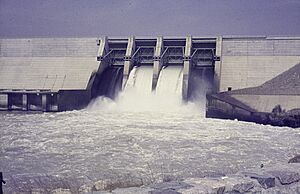
Nigeria uses more energy than it can produce. Most of its energy comes from fossil fuels (73%), with hydropower making up the rest (27%). Nigeria has been exploring nuclear energy to meet its growing needs. It signed agreements with Russia in 2017 for the construction of nuclear power plants.
Electricity Access
Many Nigerians are connected to the national electricity grid, but only a small percentage have electricity 24 hours a day. Most people have electricity for only a few hours a day. Many Nigerians are willing to pay more for a constant electricity supply. Some people use power generators or solar energy.
Factories and Technology
Nigeria has a growing manufacturing industry that makes leather goods, textiles, plastics, and processed food. Ogun State and Lagos are major industrial centers. The city of Aba is known for its handicrafts and shoes. Nigeria has a large car market, but most cars are imported rather than made in the country.
In 2016, Nigeria was the leading producer of cement in Sub-Saharan Africa. Nigeria's richest person, Aliko Dangote, built his wealth on cement production.
In June 2019, Nigeria EduSat-1, the first satellite built in Nigeria, was launched from the International Space Station. Nigeria is also a major center for pharmaceutical production in Africa. The country has electronic manufacturers and is home to several successful technology companies.
Internet and Phones
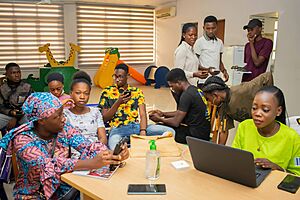
Nigeria's telecommunications market is one of the fastest-growing in the world. Major phone companies have large operations there. The technology sector has grown significantly, making up 10% of the country's GDP in 2018. Lagos is a major technology hub in Africa. Most adult Nigerians own a mobile phone.
Tourism and Travel
Tourism in Nigeria focuses on its many cultural events, rainforests, savannahs, and waterfalls. Abuja has several parks, including the large Millennium Park. Lagos is becoming a major tourist spot, known for its business activity and vibrant culture.
Lagos has sandy beaches along the Atlantic Ocean, like Elegushi Beach. It also has many hotels and places of interest, such as the Nike Art Gallery and Freedom Park.
Getting Around Nigeria
Transport is very important in Nigeria. The government has invested in repairing roads and building new ones, like the Second Niger Bridge near Onitsha, which was mostly finished in 2022. Nigeria has the largest road network in West Africa, covering about 200,000 kilometers. Roads handle most of the passenger and freight traffic.
Roads
Four major Trans-African highways pass through Nigeria. While federal roads are being improved, the condition of state roads varies. Poor maintenance can make travel difficult, especially during the rainy season.
Trains
Railways in Nigeria have been greatly improved. Projects like the Lagos–Kano Standard Gauge Railway connect major cities. Lagos and Abuja also have their own city train services.
Air Travel
Nigeria's aviation industry is growing fast. Passenger traffic increased significantly from 2020 to 2021. In December 2021, the Anambra International Cargo Airport opened. In April 2022, a new terminal at the Murtala Muhammed International Airport in Lagos opened, increasing its capacity to 14 million passengers per year.
There are 54 airports in Nigeria. The main ones are in Lagos, Abuja, Kano, Enugu, and Port Harcourt. The largest airline in Nigeria is privately owned Air Peace.
People and Culture of Nigeria
The United Nations estimated Nigeria's population in 2018 to be 185,989,640. About half of the people live in rural areas and half in cities. Nigeria is the world's sixth-most populous country. Its population grew by 57 million from 1990 to 2008.
Many Nigerians have moved to other countries, especially to Europe and North America, during times of economic difficulty. Nigeria's largest city, Lagos, has grown from about 300,000 people in 1950 to an estimated 13.4 million in 2017.
Nigeria has more than 250 ethnic groups, each with its own languages and customs. This creates a very rich and diverse culture. The three largest groups are the Hausa, Yoruba, and Igbo, who together make up over 60% of the population. Other groups include the Edo, Ijaw, Fulani, and Kanuri.
Languages Spoken in Nigeria
Nigeria has 525 languages, though eight are now extinct. English is the official language, chosen to help unite the country after British rule ended in 1960. Nigerian Pidgin English, also known as "Pidgin," is a popular language used for everyday communication, especially in the Niger Delta region.
The major languages spoken in Nigeria come from three main African language families. Most are Niger-Congo languages, like Igbo and Yoruba. Kanuri is part of the Nilo-Saharan family, and Hausa is an Afroasiatic language. Even though English is official, many people prefer to speak their native languages. Hausa is the most widely spoken of the three main languages.
Religions in Nigeria
Religion in Nigeria (2018 estimate by CIA World Factbook) Islam (53.5%) Protestant (35.3%) Catholic (10.6%) Other (0.6%)
Nigeria is a country with a large Muslim population and a significant Christian minority. Some people also follow traditional African religions. In areas where Islam and Christianity are common, people sometimes blend these beliefs with older traditions.
According to a 2018 estimate by the CIA, about 53.5% of the population is Muslim, and 45.9% is Christian (including Protestants and Catholics). About 0.6% follow other religions.
Islam is most common in northwestern and northeastern Nigeria. In the west, the Yoruba are mostly Christian, with many Muslims and some followers of traditional religions. Protestant and local Christian faiths are widely practiced in Western areas, while Catholicism is more common in southeastern Nigeria. The Igbos and Ibibio in the south are mostly Christian. The Middle Belt of Nigeria has many different ethnic groups, who are mostly Christian or follow traditional religions, with a notable Muslim minority.
Health and Well-being
Healthcare in Nigeria is managed by the government and private organizations. Since 1987, Nigeria has worked to improve access to healthcare and medicines for its people. This has led to better health services.
Almost half of Nigerians report getting sick in the last three months, with Malaria and typhoid fever being common illnesses. Many people go to hospitals or pharmacies for treatment. Tuberculosis is also a significant health concern.
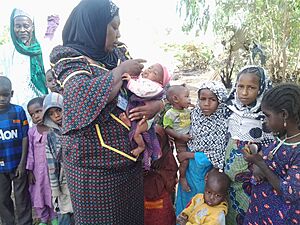
The HIV/AIDS rate in Nigeria is lower than in some other African countries. In 2019, the HIV rate among adults was 1.5%. Life expectancy in Nigeria is about 54.7 years. In 2014, Nigeria successfully contained the Ebola outbreak using a special method of tracking contacts.
Nigeria faces a challenge with many skilled doctors choosing to work in other countries. Keeping these trained professionals in Nigeria is an important goal for the government.
Learning and Education
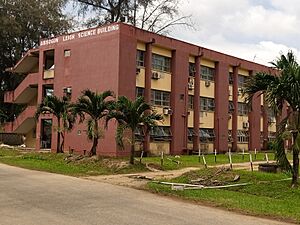
Education in Nigeria is managed by the Ministry of Education. Local authorities help carry out education policies. The education system includes kindergarten, primary school, secondary school, and university. After the oil boom in the 1970s, university education expanded across Nigeria. About 68% of Nigerians can read and write.
Nigeria offers free, government-supported education, but attending school is not mandatory at all levels. About 10.5 million Nigerian children aged 5–14 years are not in school. The education system has six years of primary school, three years of junior secondary, three years of senior secondary, and then university. Nigeria has 138 universities, both public and private. In 2025, Nigeria was ranked 105th in the Global Innovation Index.
Addressing Poverty
Many people in Nigeria face economic challenges. According to the International Monetary Fund, 32% of Nigeria's population lived in extreme poverty in 2017. The World Bank reported in March 2022 that the number of poor Nigerians had increased to 95.1 million during the Covid period. This means about 40% of Nigerians live below the World Bank's poverty line. Organizations are working to help reduce poverty and improve living conditions for everyone.
Human Rights Efforts
Nigeria is working to ensure that all its citizens have their rights protected. The country has signed international agreements to support women's rights and is working to address challenges like discrimination and violence. There are efforts to improve safety and fairness for everyone.
Nigeria's Vibrant Culture
Books and Stories
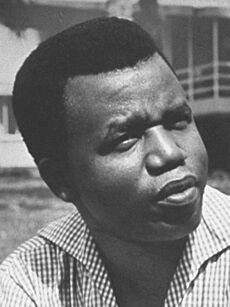
Most Nigerian literature is written in English, which many Nigerians understand. However, there are also books in Yoruba, Hausa, and Igbo languages. Famous Nigerian writers include Wole Soyinka, who won the Nobel Prize for literature, and Chinua Achebe, who won the Booker Prize in 2007.
Music and Sounds
Nigeria has a rich history of popular music. In the 1920s, palm-wine music was popular. The 1950s and 1960s saw the rise of Highlife music, with artists like Osita Osadebe. The 1970s were the era of Fela Kuti, who created the Afrobeat genre.
In the 1980s, King Sunny Ade became famous for Juju Music. Later, Hip hop Music gained popularity in the 1990s. In the 2000s, artists like P-Square, 2face, and Dbanj helped make Afrobeats popular around the world. Today, artists like Davido, Wizkid, and Burna Boy are well-known.
Movies and Films
Top five highest grossing Nigerian films as at 2024:
- Everybody Loves Jenifa (₦1.7 billion) - 2024 film
- A Tribe Called Judah (₦1.4 billion) - 2023 film
- Battle on Buka Street (₦668 million) - 2022 film
- Omo Ghetto: The Saga (₦636 million) - 2020 film
- Alakada: Bad and Boujee (₦460 million) - 2024 film
The Nigerian film industry is called Nollywood. It is now the second-largest producer of movies in the world, after India's Bollywood. Nigerian film studios are in cities like Lagos, Kano, and Enugu. Nollywood has grown a lot thanks to affordable digital filming technology.
Films like The Figurine (2009) and Ijé (2010) gained international attention. By 2014, the industry was worth about $5.1 billion and contributed about 1.4% to Nigeria's economy.
Festivals and Celebrations
Nigeria has many festivals in Nigeria, some of which are very old. Major Muslim and Christian festivals are celebrated in unique Nigerian ways. The Nigerian Tourism Development Corporation is working to improve these traditional festivals to attract more visitors.
Delicious Nigerian Food
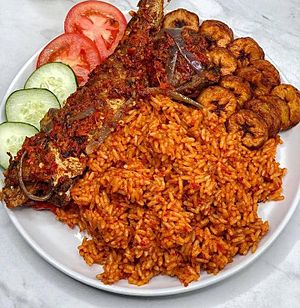
Nigerian cuisine is known for its rich and varied flavors. Many spices, herbs, and flavorings are used with palm oil or groundnut oil to create tasty sauces and soups, often made spicy with chilli peppers. Nigerian feasts are colorful and grand. Popular snacks like Suya are often sold in urban areas at night.
Fashion and Style
Nigeria's fashion industry is an important part of its economy. People wear casual clothes, but also formal and traditional styles for special events. Nigeria is famous for its beautiful textiles and garments, and its fashion designers are gaining international recognition. The fashion market in Sub-Saharan Africa is worth $31 billion, with Nigeria making up 15% of that.
Sports and Games
Football is considered Nigeria's national sport. The country has its own professional league. Nigeria's national football team, the "Super Eagles," has played in the FIFA World Cup six times. They won the Africa Cup of Nations in 1980, 1994, and 2013. They also won the gold medal for football at the 1996 Summer Olympics.
Nigeria also excels in other sports like basketball and track and field. The national basketball team made history by being the first African team to beat the United States men's national team. Many Nigerian basketball players have become famous in top leagues around the world.
In 2018, Nigeria made history by sending its first bobsled team from Africa to the Winter Olympics. Scrabble is also a popular official sport in Nigeria, with many clubs and players. The Nigerian Curling Federation was started in 2018 to introduce curling to the country.
Nigeria's national teams also compete in beach volleyball. The sport of loofball was also created in Nigeria.
See also
 In Spanish: Nigeria para niños
In Spanish: Nigeria para niños
 | George Robert Carruthers |
 | Patricia Bath |
 | Jan Ernst Matzeliger |
 | Alexander Miles |




